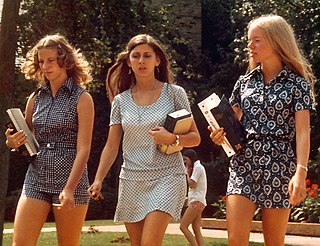Working age is the range of ages at which people are typically engaged in either paid or unpaid work. It typically sits between the ages of adolescence and retirement.
In most countries there is a minimum age at which people can legally work.
Working age is the range of ages at which people are typically engaged in either paid or unpaid work. It typically sits between the ages of adolescence and retirement.
In most countries there is a minimum age at which people can legally work.
Labour laws are those that mediate the relationship between workers, employing entities, trade unions and the government. Collective labour law relates to the tripartite relationship between employee, employer and union. Individual labour law concerns employees' rights at work also through the contract for work. Employment standards are social norms for the minimum socially acceptable conditions under which employees or contractors are allowed to work. Government agencies enforce labour law.

A sanctuary, in its original meaning, is a sacred place, such as a shrine. By the use of such places as a haven, by extension the term has come to be used for any place of safety. This secondary use can be categorized into human sanctuary, a safe place for people, such as a political sanctuary; and non-human sanctuary, such as an animal or plant sanctuary.
Biologically, an adult is an organism that has reached sexual maturity. In human context, the term adult has meanings associated with social and legal concepts. In contrast to a "minor", a legal adult is a person who has attained the age of majority and is therefore regarded as independent, self-sufficient, and responsible. The typical age of attaining legal adulthood is 18, although definition may vary by legal rights, country, and psychological development.

In general, an assistance dog, known as a service dog in the United States, is a dog trained to aid or assist an individual with a disability. Many are trained by an assistance dog organisation, or by their handler, often with the help of a professional trainer.

Coming of age is a young person's transition from being a child to being an adult. It continues through adolescence. The specific age at which this transition takes place varies between societies, as does the nature of the change. It can be a simple legal convention or can be part of a ritual or spiritual event, as practiced by many societies. In the past, and in some societies today, such a change is associated with the age of sexual maturity (puberty), especially menarche and spermarche. In others, it is associated with an age of religious responsibility. Particularly in western societies, modern legal conventions which stipulate points in late adolescence or early adulthood are the focus of the transition. In either case, many cultures retain ceremonies to confirm the coming of age, and coming-of-age stories are a well established sub genre in literature, film industry and even comics.

Construction is a general term meaning the art and science to form objects, systems, or organizations, and comes from Latin constructio and Old French construction. To construct is the verb: the act of building, and the noun is construction: how something is built, the nature of its structure.

A police officer, also known as a policeman/policewoman, is a warranted law employee of a police force. In most countries, "police officer" is a generic term not specifying a particular rank. In some, the use of the rank "officer" is legally reserved for military personnel.

Youth is the time of life when one is young, and often means the time between childhood and adulthood (maturity). It is also defined as "the appearance, freshness, vigor, spirit, etc., characteristic of one who is young". Its definitions of a specific age range varies, as youth is not defined chronologically as a stage that can be tied to specific age ranges; nor can its end point be linked to specific activities, such as taking unpaid work or having sexual relations.
Freelance, freelancer, or freelance worker, are terms commonly used for a person who is self-employed and not necessarily committed to a particular employer long-term. Freelance workers are sometimes represented by a company or a temporary agency that resells freelance labor to clients; others work independently or use professional associations or websites to get work.

The dependency ratio is an age-population ratio of those typically not in the labor force and those typically in the labor force. It is used to measure the pressure on the productive population.

A law firm is a business entity formed by one or more lawyers to engage in the practice of law. The primary service rendered by a law firm is to advise clients about their legal rights and responsibilities, and to represent clients in civil or criminal cases, business transactions, and other matters in which legal advice and other assistance are sought.
Labor rights or workers' rights are both legal rights and human rights relating to labor relations between workers and employers. These rights are codified in national and international labor and employment law. In general, these rights influence working conditions in relations of employment. One of the most prominent is the right to freedom of association, otherwise known as the right to organize. Workers organized in trade unions exercise the right to collective bargaining to improve working conditions.

Picketing is a form of protest in which people congregate outside a place of work or location where an event is taking place. Often, this is done in an attempt to dissuade others from going in, but it can also be done to draw public attention to a cause. Picketers normally endeavor to be non-violent. It can have a number of aims, but is generally to put pressure on the party targeted to meet particular demands or cease operations. This pressure is achieved by harming the business through loss of customers and negative publicity, or by discouraging or preventing workers or customers from entering the site and thereby preventing the business from operating normally.

In law, a trial is a coming together of parties to a dispute, to present information in a tribunal, a formal setting with the authority to adjudicate claims or disputes. One form of tribunal is a court. The tribunal, which may occur before a judge, jury, or other designated trier of fact, aims to achieve a resolution to their dispute.
A legal secretary is a particular category of worker within the legal profession.

Rehabilitation counseling is focused on helping people who have disabilities achieve their personal, career, and independent living goals through a counseling process.
Unreported employment, also known as money under the table, working under the table, off the books, cash-in-hand, or illicit work is illegal employment that is not reported to the government. The employer or the employee often does so for tax evasion or avoiding and violating other laws such as obtaining unemployment benefits while being employed. The working contract is made without social security costs, and does typically not provide health insurance, paid parental leave, paid vacation or pension funds. It is a part of what has been called the underground economy, shadow economy, black market or the non-observed economy.
A work permit or work visa is the permission to take a job within a foreign country.

A job, employment, work or occupation, is a person's role in society. More specifically, a job is an activity, often regular and often performed in exchange for payment. Many people have multiple jobs. A person can begin a job by becoming an employee, volunteering, starting a business, or becoming a parent. The duration of a job may range from temporary to a lifetime.
Second-generation gender bias refers to practices that may appear neutral or non-sexist, in that they apply to everyone, but which discriminate against a gender because they reflect the values of the gender who created or developed the setting, usually a workplace. It is contrasted with first-generation bias, which is deliberate, usually involving intentional exclusion.